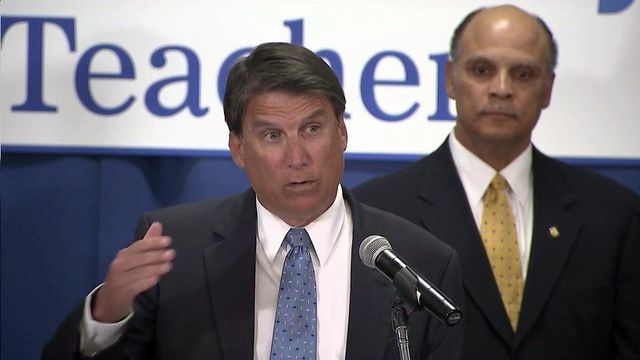Three numbers, big question on teacher pay
Gov. Pat McCrory and Lt. Gov. Dan Forest will roll out plans to boost teacher pay today. But they will face questions about how to pay for increased salaries amid lagging revenues and increased demands for the state Medicaid program.
Posted — UpdatedIn this case, the offending vegetable is how to pay for a plan that McCrory says "rewards teachers, focuses on students and addresses the long term."
The governor is expected to make his announcement in Greensboro at 10 a.m. Forest will follow up in the afternoon with a separate teacher pay proposal.
As state leaders talk about what they're going to do for educators, three numbers should be top of mind:
How much more will the moves announced in these new plans cost, and how much further will they go that what's already been announced? Will they provide a pay bump for all teachers?
But even if the state is able to absorb this year's shortfall, there will be questions about whether expectations for future years need to be adjusted downward. That loss of recurring revenue could hamper any plan to add recurring costs to the state budget.
While $130 million isn't a budget-busting number in and of itself, the real question is what it means going forward. Every year, budget writers must "re-base," or move up, the amount they anticipate Medicaid will cost every year. This year's overruns drive up the cost of that re-base. In a memo to senior budget writers obtained by WRAL News, Steve Owen, a fiscal analyst, estimates that re-base will cost between $156 million and $192 million.
However, those numbers are far from firm. The state is still struggling to get a handle on Medicaid claims data and is having to estimate the cost of the program because a new computer system is not yet able to produce accurate information.
Also worth noting: Rick Brennan, who has been the chief financial officer for the state's Medicaid program, resigned this week, less than eight days before lawmakers return to session and begin focusing on the coming year's budget in earnest.
Related Topics
• Credits
Copyright 2024 by Capitol Broadcasting Company. All rights reserved. This material may not be published, broadcast, rewritten or redistributed.






